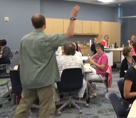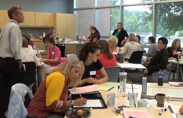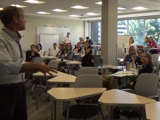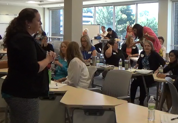Below you will find links to the recorded sessions as well as handouts from our Development Day event on Aug. 16, 2017. This event was made possible, in part, by Steelcase Education and the active learning furniture that they generously provided to Nebraska Methodist College (NMC). We had a wonderful line-up of sessions! To see our agenda, click on the image below. Click here to access the handouts for this event.

Participants at this event attended the following sessions. Click on the images/links below to view the video recordings for each session. Please note, however, that this event utilized group and project-based active learning strategies throughout, which means that there was a whole lot of learning happening without much lecturing. In other words, some of the videos might not be as helpful as the handouts.
1) Course Design with the Learner in Mind
In this session, you will learn how to collaborate with learners in adapting course objectives, activities, resources, and assessments to build upon learners’ prior knowledge, interests, and skills as well as to integrate diverse cultural resources, practices, and perspectives into your classes. Facilitated by Heather Henrichs.

2) Roadmaps for Teaching & Learning
Recognizing that students learn and develop in diverse ways, this session will focus on how to utilize multiple evidence-based learning theories and teaching strategies to help guide course development. Facilitated by Larry Hughes.

3) Personalized Self-Regulated Learning
In this session, we will explore how to partner with learners to identify personalized learning objectives to reach long term goals. We will also discuss how to build learners’ self-regulated learning skills, guiding them to reflect on their own performance and develop concrete strategies for how they will continue to improve in the course. Facilitated by Eric Kyle. Oops, we had difficulty with our equipment for this session and weren't able to record it - sorry!

4) Higher Order & Highly Engaged
This session will focus on how to develop courses that work with learners to design and implement higher order thinking experiences that are aligned with learning objectives, result in a variety of outcomes and artifacts, and build on learners’ interests and backgrounds. Facilitated by Larry Hughes. Oops, we started this video recording after the introductory statement and during group work.

5) Group Work that Transforms
By the end of this session, you should have a better understanding of how to develop courses that contain long-term group projects/activities where teams are required to collaborate in substantive ways (e.g., decision-making, problem solving, exploration, invention, etc.). Facilitated by Heather Henrichs.

Enjoy!